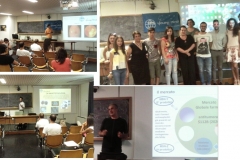 The EPS YM Section of University of Calabria has organized a cycle of seminars aimed at highlighting the contribution of nanotechnology and two-dimensional materials in the novel field of nanomedicine.
The EPS YM Section of University of Calabria has organized a cycle of seminars aimed at highlighting the contribution of nanotechnology and two-dimensional materials in the novel field of nanomedicine.
We have tried to put in evidence the interdisciplinary nature of nanomedicine and the key role of physics and materials science.
In a first seminar, Dr. Marco Alfano has discussed bioengineering and tissue engineering, by reporting the most striking innovations in the field, with a particular attention to the printing of artificial organs and their surgical implantation. The most astonishing issue addressed in the seminar was the motivation behind the puzzling evidence that an artificial nose or ear grows in time in young patients. Moreover, a video showing the printing of an artificial bone has been projected.
The role of materials science and engineering has been clarified.
We have invited prof. Luigi Pasqua of the Chemical Engineering Department for a second seminar on the role of chemistry in nanomedicine and, moreover, the impact of nanotechnology in pharmaceutics.
In the second seminar, prof. Pasqua has illustrated his proper research activity in collaboration with the Department of Chemistry and the Department of Pharmacy of our University. Prof. Pasqua’s team has developed multifunctional hybrid mesoporous silica-based materials, potentially useful for drug targeting or as sensors. The creation and structuring of the matter as molecular systems, at the nanometer scale, represents the possibility to interact with biological systems and to produce devices potentially useful in cancer therapy. Some success stories have been reported.
Such an interdisciplinary research has led to a highly innovative spin-off, funded by Calabria Region. A careful evaluation of prospects, opportunities and challenges has been provided. In particular, the global market of nanopharmaceutics has been carefully evaluated in all its aspects, in order to give the participants an overview of the relationship between the business world and nanotechnology.
In a third seminar, dr. Antonio Politano from Department of Physics of University of Calabria has reported the challenges of nanomedicine with two-dimensional materials. In particular, the key issues in artificial retina have been discussed, with a particular attention for the role of flexible nanoelectronics. Biocompatibility of two-dimensional materials has been also treated, with some case-study examples.
Refreshments with some beverages and snacks have been offered to the participants.
